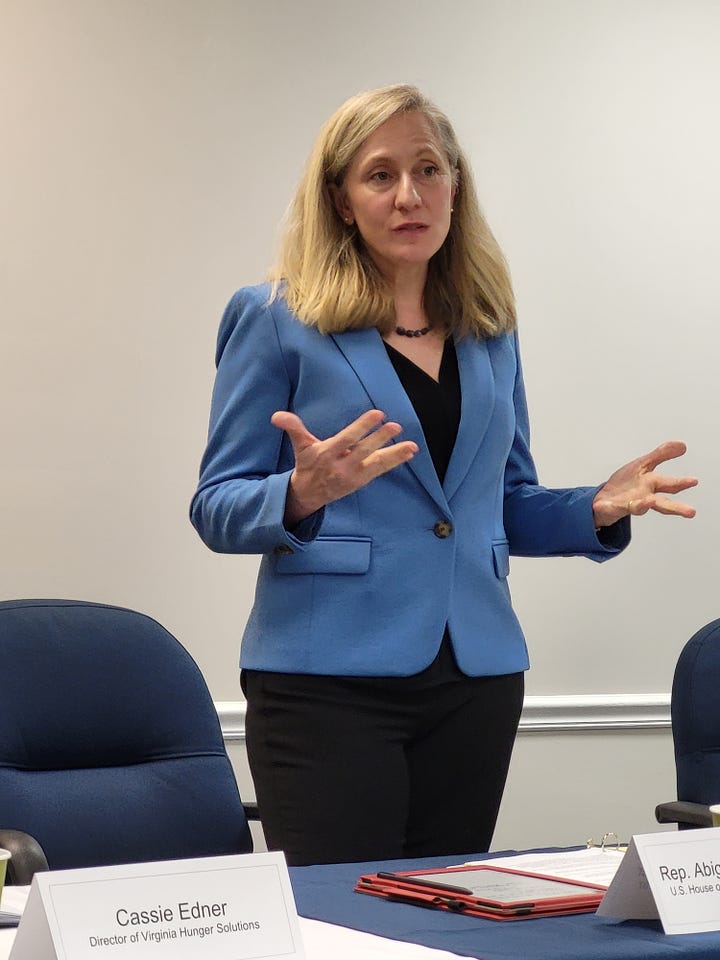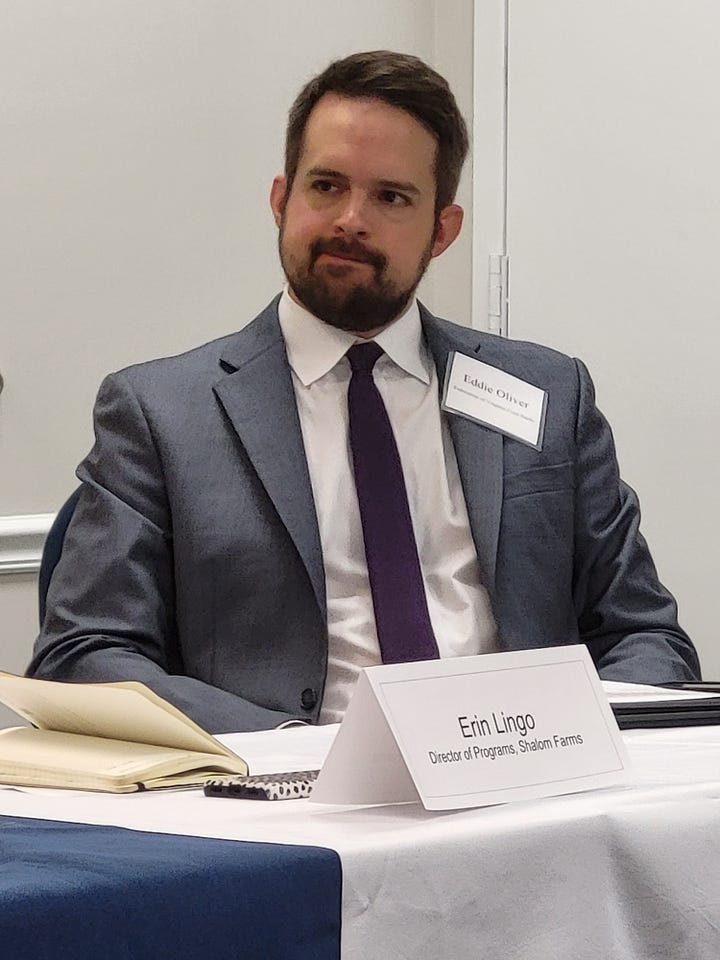Friday June 2, 2023
ANALYSIS: Ag Bills, and the Human Face of Hunger | Juneteenth | Balance (from Pie and Chai magazine | Coming Monday | Invite a Friend to join F2S |
ANALYSIS: The Ag Bill …
… and the human face of hunger
by Martin Davis


In the 1970s, Ronald Reagan created the “Welfare Queen” myth. It helped him win the presidency in 1980. But 50 years on, it remains a gross distortion of the welfare system that is undermining our ability as a people to serve those who are in need.
Shawnte Brown is the antithesis of a welfare queen, and more typical of the people who depend on programs like SNAP, which is the largest nutritional assistance program offered by the federal government.
Seated at the table alongside Rep. Abigail Spanberger, Brown shared her story as part of a listening event at the Fredericksburg Regional Food Bank on Thursday.
Widowed in 2012 with a young child because her husband was killed in a freak accident, she suddenly found herself with a mortgage, a growing number of bills, and no way to put food on the table.
Over the next several years, Brown used an array of federal and state programs to keep herself and her family fed, including SNAP, TANF (Temporary Aid for Needy Families), WIC (Special Supplemental Nutrition Program for Women, Infants, and Children), and the View Program, a Virginia program that offers qualified parents using TANF the assistance and resources needed to find and keep a job.
These programs kept Brown and her children healthy, and led to her finding steady employment and launching her own nonprofit helping other people in need.
Eddie Oliver, director of the Federation of Virginia Food Banks, stressed that despite the negative stereotypes that are frequently used to shame the poor and support cutting funding for these programs, the incidence of fraud in SNAP “is low.” A fact highlighted in a 2013 article for The Atlantic by Eric Schnurer.
It’s not easy to get agreement on actual fraud levels in government programs. Unsurprisingly, liberals say they’re low, while conservatives insist they’re astronomically high. In truth, it varies from program to program. One government report says fraud accounts for less than 2 percent of unemployment insurance payments. It’s seemingly impossible to find statistics on “welfare” (i.e., TANF) fraud, but the best guess is that it’s about the same. A bevy of inspector general reports found “improper payment” levels of 20 to 40 percent in state TANF programs -- but when you look at the reports, the payments appear all to be due to bureaucratic incompetence (categorized by the inspector general as either “eligibility and payment calculation errors” or “documentation errors”), rather than intentional fraud by beneficiaries.
Note that those committing the fraud aren’t “scheming low-income beneficiaries -- Mitt Romney’s 47 percent -- living high on the hog on your dime, but rather someone other than the beneficiary standing to make a buck off it.”
But myths die hard, especially on Capitol Hill, and there are forces mounting to strip critical funding from the Agriculture Bill, which is currently being debated in preparation for reauthorizing it - something that happens roughly every five years.
It’s one reason that SNAP is going to face calls for more cuts. We know these attacks are coming against SNAP because during the Debt Ceiling debate, SNAP was one of the programs targeted.
Rep. Spanberger, who described herself as ever the “optimist,” said that because of this debate, “Now we know some of the challenges and some of the potential attacks that we will be facing against SNAP as we continue into the Farm Bill.”
A Growing Challenge
For people like Brown, and the 850,000 or so Virginians who use SNAP, the consequences of diminished benefits is not an idealistic debate, but a terrifying reality they are already living with.
Cassie Edner, director of Virginia Hunger Solutions, noted during the forum that with the end of COVID assistance, families with children are losing $95 in benefits per child. She further noted that for some elderly patients she knows, they are seeing their benefits reduced from $283 a month down to $23. This forces them to literally choose between food and medicine.
And the challenges keep growing.
In his opening remarks, Fredericksburg Regional Food Bank President and CEO Dan Maher noted that not only are demands for food up, but:
federal commodities, which are so essential to the Farm bill, have been reduced over the last few years. Year-over-year it’s only down about 3% this year compared to last year, but it’s down 49% compared to two years ago when TEFAP products was rolling into communities around the county at unprecedented levels.
One way Maher and the Fredericksburg Regional Food Bank are dealing with this shortage is to ensure that more people are signing up for SNAP, which is seriously underutilized. In fact, 3 out of 4 people eligible for SNAP benefits do not get them.
Do you qualify for SNAP? This simple test at Benefits.gov will tell you.
That alone, however, won’t be enough.
Tracey Bailey who runs the food pantry at Chancellor Baptist Church in Spotsylvania - one of the largest distribution sites in the region - noted that they serve about 25,000 families a year, and distribute some three-quarters-of-a-million pounds of food.
Key to their ability to serve these families is TEFAP.
They get two trucks a week. “An 8,000 pound truck usually on Tuesday night with canned goods and dry goods from the Food Bank…. and a 7,000 or 8,000 pound truck on Wednesday morning of the perishables and frozen food.” A good portion of that food is supplied by the TEFAP program.
These deliveries mean the church doesn’t have to store such large amounts of food for weeks on in. It goes out the door shortly after it arrives.
His concern is that transportation and storage costs are a point of debate in the bill. If that is cut, he worries that it will diminish his ability to serve the 300-plus people they regularly serve on a given day. The church doesn’t have the capacity to store some 16,000 pounds of food if storage is cut.
It’s an excellent example of how a political debate over costs can inadvertently have devastating impacts on local communities.
Rep. Spanberger noted that because food security has become “partisan,” issues like transportation can become a target for those who want to cut funds.
They won’t “take food out of the mouth of a senior,” she said, but they will argue that the transportation cost is not necessarily the best use of federal dollars.
Will restarting student loans make a tough situation worse?
Though no one can peg precisely how many people will be affected by restarting student loans, there’s little disagreement that these loans are going to stress a large body of not only young families just out of school, but older people, too, who are carrying debt for their children through PLUS loans.
Oliver conceded that this is an issue that “we probably should be thinking about more.” Attention has been paid to college students, he adds, with the addition of a number of food banks and other support systems.
Rep. Spanberger noted that it’s not just student loans, but there’s also the significant inflation pressure everyone has contended with over the past few years.
One key, she noted, will be education and making sure that if loan debt puts people in a position where they qualify for SNAP benefits, they get them. Again, 75% of people who currently qualify for SNAP do not get those benefits.
The question is, of that 75%, what percentage of those people carry student loans? There was no immediate answer to that question, though Maher promised to look into that data, and we will be following up with him.
We can be sure that restarting student loans isn’t going to make life easier for people, and will almost certainly throw more people into food scarcity.
A Chance to Move to Solutions
Shawnte Brown’s story of moving from dependence to self-sufficiency; correcting inaccurate charges about abuse of federal programs by the poor; illuminating not only the needs people face, but the underutilization of government programs; and the dangers of making ill-advised cuts that will negatively affect local programs like that at Chancellor Baptist Church should be a reminder to us that government works best when it takes a solutions-first approach to these issues.
In our most-recent New Dominion podcast episode, Stafford’s Commissioner of Revenue made the argument that in Stafford anyway, there are signs that people are beginning to put solutions over politics.
That spirit was alive and well at the Fredericksburg Regional Food Bank today, as constituents from across the 7th District and beyond gathered to talk about how to solve a critical and growing problem in our community - food scarcity.
Reagan once argued that government is the problem.
He couldn’t have been more wrong.
At least on this day, thankfully, a band of dedicated citizens came together to ensure that government was working for the betterment of everyone in our community.
Take that, Mr. Reagan.
To read more about this event, visit Adele Uphaus’ fine piece for the Free Lance-Star.
Want to get involved? Stay on top of the Farm Bill reauthorization by subscribing to the Agriculture Committee’s newsletter.
Learn more about our representative in Congress by visiting Abigail Spanberger’s website.
Over the past decade, Juneteenth has grown in the public imagination. What was an unknown event even to many Black people 10 years ago, is now growing into a celebration that is rightfully taking its place along July 4 in the pantheon of American celebrations of freedom.
Learn more about Juneteenth and its history from this National Geographic story.
This year, one of the region’s largest celebrations will be held at the John J. Wright Educational and Cultural Center Museum in Spotsylvania County. Scan the QR code in the image above, or visit the website, to learn more and to join in the activities.
Coming Monday
Episode 5 of the New Dominion Podcast was recorded Thursday evening, and it will be live this Monday.
Now’s a great time to start listening. We have some well-known, and high-level guests on the horizon, and you won’t want to miss them. So watch here, and follow us on Spotify.
Balance
A poem recently published by our friends at Pie and Chai
By Emily Whorley
The idea is balance, right?
Then show me the balance.
Show me.
Show me what evens out all the death.
All the trauma,
All the hunger,
The Fear
The Pain
Disease
Apathy
Violence
Terror
Carelessness
Willful ignorance.
Tell me, where’s the balance?
You say “Just be happy” or “Smile.”
I don’t want to smile.
I don’t want to “Just be happy.”
I don’t want the slogans and sayings and empty promises.
Your “Thoughts and prayers” are not enough
Your apologies are cheap
Your speeches are hollow.
Do not tell us it can be remedied when you don’t listen,
Or see,
Not really.
All that you’ve said will change, hasn’t.
Not really.
Not when you move on as soon as it fades from your story
When people stop posting about it.
Help me find the balance in a place where our leaders care more about numbers then people. Where students are trying just to
survive,
And you want to talk about their SOL scores?
Show me the balance in a place where a person can fear for their life because of what they look like
Or where they’re from
Or what religion they believe
Or simply by going to school.
Where a person can slaughter a nation and
feel justified.
Where people die from broken hearts.
Where people gun down first graders
Or civilians in a grocery store.
Where people live believing there is nothing
for them
Because no one’s bothered to show them
otherwise .
I am on my knees
God, show me
the balance.
Emily Whorley is a recent high school graduate from Stafford County, Virginia.
A Special Word to Our Readers
Since leaving the Free Lance-Star in January, a great deal has happened not only in my life, but in our region’s media consumption. F2S has made remarkable jumps in readership in a very short time. We’ve begun adding staff. We’ve launched a podcast with our partner Shaun Kenney. And we are playing a major role in our local civic square through debates and promoting events such as Juneteenth.
These changes have created some unique opportunities, and we’ll have much more to say about this in coming months.
As we ramp up our work, help us spread the word about F2S by inviting a friend to join.
Our material is free to any readers who want to access it, so no one has to pay to read what we provide. We are enormously grateful to everyone who does support us, however. (And we have some plans to thank those people this summer - so watch your emails!)
Pass along this link (https://thelocalburg.substack.com/p/welcome-to-f2s), or the following QR code, and ask folks to sign up.





